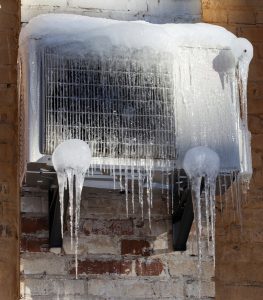
It’s okay if you don’t know the specific workings of your air conditioning system. Many people who drive cars have little idea about their mechanics, they simply know when to rely on people who do in case the car needs maintenance or repairs. It’s the same for air conditioning. You only need to know the basics of when to call for air conditioning repair in Portland, OR to let the experts handle the issue.
So, if you don’t realize that ice appearing on your air conditioner is a sign of a problem, we understand. This is an easy mix-up to make if you aren’t aware of how refrigeration equipment works. An air conditioner sends out cold ai, and it seems to make sense that ice might be a byproduct of the cooling process. But ice developing on an air conditioner’s evaporator coil is a major warning sign of something wrong—and you’ll need professionals to investigate it and repair the source of the problem.
Why the Iced-Over AC Coil Is a Problem
An air conditioner doesn’t use ice at any point in the cooling process. The system draws heat from the air by evaporating cold refrigerant in a coil, a process that causes heat in the air moving past it to be absorbed, raising the temperature of the refrigerant before it heads back to the compressor. This is part of the heat exchange process—moving heat from one place to another—and it doesn’t involve ice.
Ice appears if the refrigerant in the coil doesn’t warm up. If it remains too cold, the moisture in the air will freeze on the coil. There are a number of reasons this may happen.
- Clogged Air Filter: The air filter for the HVAC system will gradually become clogged over time, and it needs to be replaced every one to three months. If a clogged filter is left in place, it will reduce the amount of warm air blown over the evaporator coil. The refrigerant won’t warm and will start to create ice.
- Dirty Coil: The evaporator coil can become layered with grime, dirt, or even mold. These create an insulating layer, making it harder for the coil to absorb heat. In turn, this triggers the development of ice.
- Refrigerant Leaks: The most concerning cause of a frozen coil is that the AC system is losing refrigerant to leaks. Less refrigerant in the coil means less heat absorption. The remaining refrigerant will be too cold, causing ice. Loss of refrigerant is a major problem because it will eventually lead to the compressor burning out. Ice on the coil is an early warning sign to have the leaks fixed and the refrigerant recharged.
Ice encourages more ice—the coil will find it harder and harder to absorb heat as the ice develops, and the problem will soon be enough to block the cooling process entirely. Don’t try to scrape the ice off: this doesn’t solve the root problem, and it may damage the coil. Instead, call on our professionals for help.
Call Clawson Heating & Air Conditioning when you need air conditioning repair service. “Connecting people to Comfort.”
